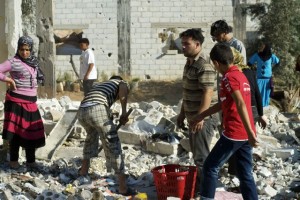
By David Enders, McClatchy Newspapers –
KHAWEIJA, Syria — On what should have been the first day of school, children in the Syrian town of Khaweija helped pick through the remains of a shop, looking for anything salvageable.
A Syrian government airstrike had reduced the shop to rubble the day before and added two victims to the cemetery atop a hill overlooking the town.
A couple of miles up the road, in the village of Jisr Beit al Ras, another airstrike had claimed the lives of five members of a farming family as they sat at the edge of a cotton field, resting in the shade of a tree.
The civil war officially spread to Syria’s two largest cities, Damascus and Aleppo, in July, but it has hardly relieved pressure on the rural areas where rebels first wrested large pieces of territory from the national government last year.
Here in the Al Ghab Plain, a rebel stronghold whose borders have become sectarian fault lines, the past months have seen rebels slowly take over more ground even as the government continues to make them pay for it with airstrikes and shelling.
The rebels now control most of the countryside in Hama, Aleppo and Idlib provinces, but the two dozen graves of people killed in Khaweija, a town of 4,000, since the uprising began in March 2011 speak to the toll it has taken in the hinterlands.
A few farms away from where the family was killed, rebels had parked a pair of 14.5 mm machine guns under some trees, waiting for the helicopters to come back. They claimed to have shot one down the previous day.
Two weeks earlier, rebels from Ahrar al Sham, one of the largest groups in the country and one that has proliferated in this area, had destroyed a tank and killed a number of soldiers as the army launched a raid in Qalat al Mudiq, the largest city in the area.
Since March, Qalat al Mudiq has existed in a bizarre sort of stasis: The army remains in an ancient citadel overlooking the city, but it’s unable to launch operations without reinforcements sent from other places. The rebels control the city below, and slowly erode the army’s positions. Last month, the rebels attacked an army checkpoint on the eastern edge of the town, forcing the soldiers to withdraw and allowing a bakery near the checkpoint to reopen. The attack also reopened the main road between Qalat al Mudiq and points east.
“We were planning to attack a checkpoint near Qastoun four days ago,” said Dabbous, an Ahrar al Sham member, referring to another town in the area. “The intelligence must have heard about it, because the army withdrew before we could attack. I think the army is ready to abandon all the checkpoints in the area, except for the ones that protect Alawite and Shiite villages.”
To a man, the armed rebels are Sunni Muslims, who make up about 70 percent of Syria’s population. President Bashar Assad is an Alawite, a minority sect that makes up about 10 percent of the population and whose adherents practice a folk religion associated with Shiite Islam.
Dabbous, who declined to be identified further for security reasons, said he had recently considered firing mortar rounds into some of the pro-government villages in the area, but had decided against it. Other rebels use rhetoric that suggests less restraint. As in Aleppo, the country’s largest city, the rebellion here increasingly is taking on the trappings of a religious, sectarian war.
The rebellion has split some of Syria’s large rural families.
“The Hamadee family has 96 defected soldiers and 27 still serving,” said Omar al Hamadee, a rebel whose extended family hails from the city of Kafr Nabouda, one of the places in the area the army still occupies. “My brother is still in the army. He is selfish; he just wants to finish his service and travel abroad.”
When rebels capture soldiers, they often call other rebel battalions from those soldiers’ hometowns to ask what should be done with them. Hamadee said he was prepared to order his brother’s death if it could be proved that he had killed rebels or civilians.
“In the revolution, the man who is fighting beside me is my brother,” he said.







